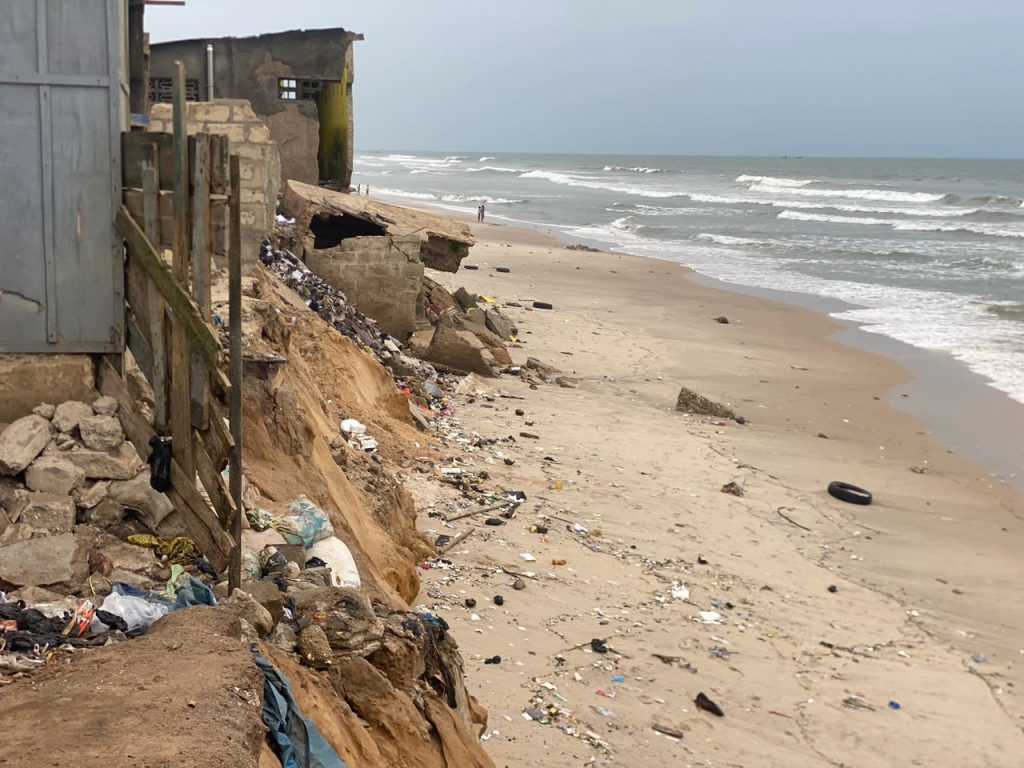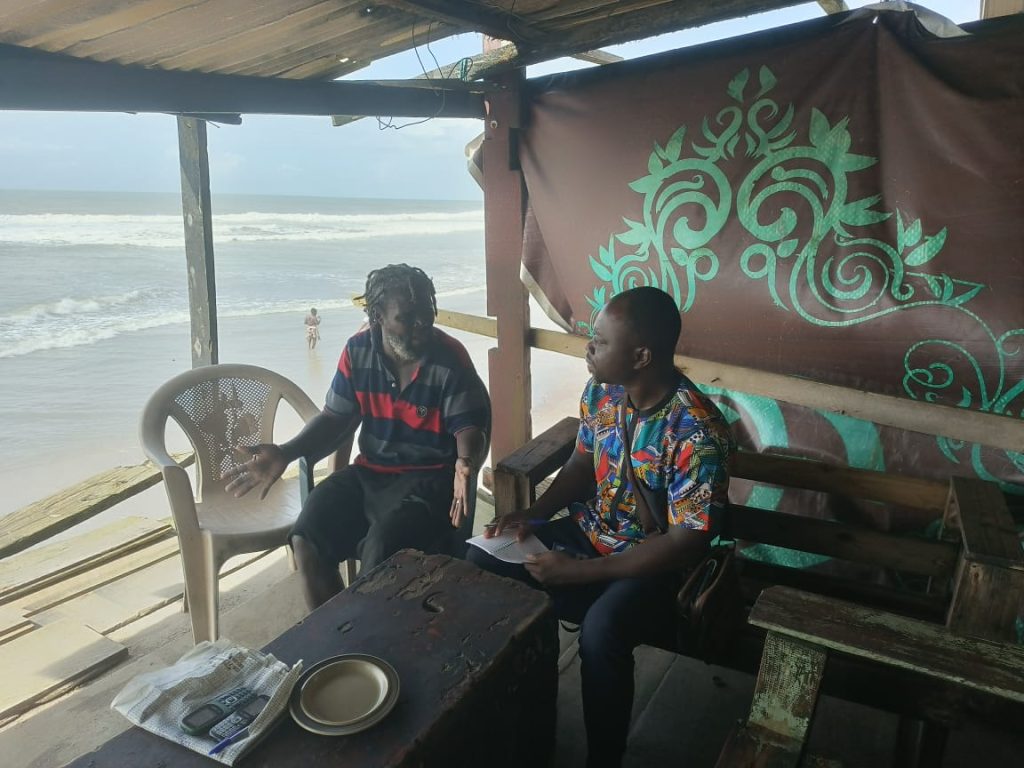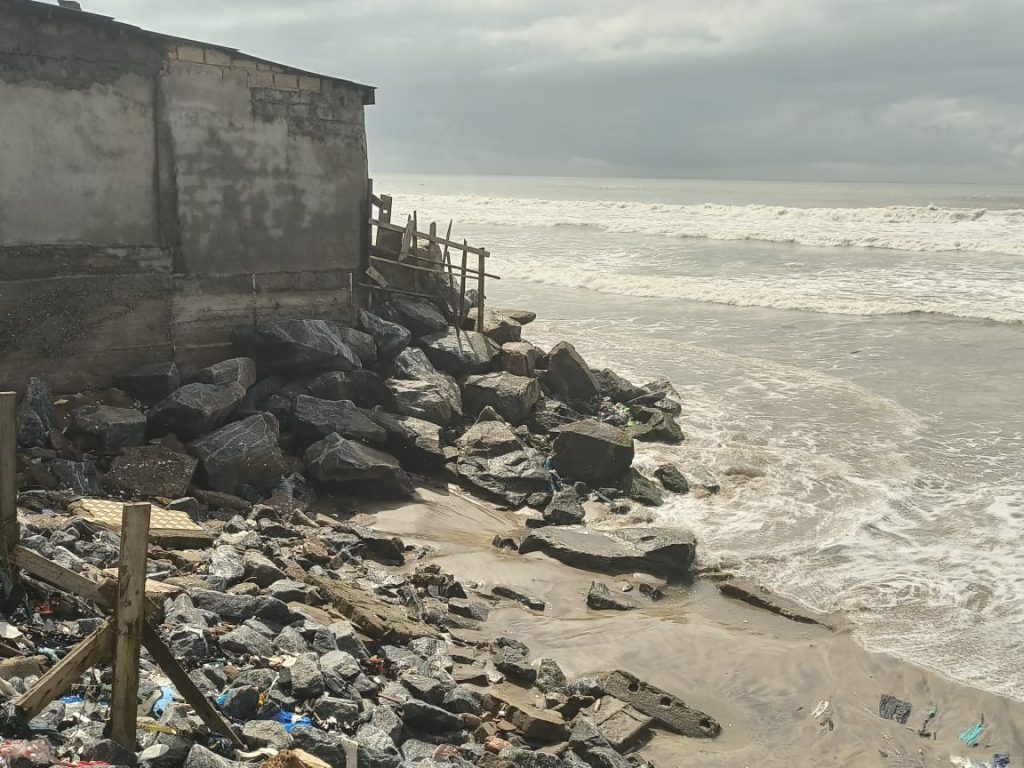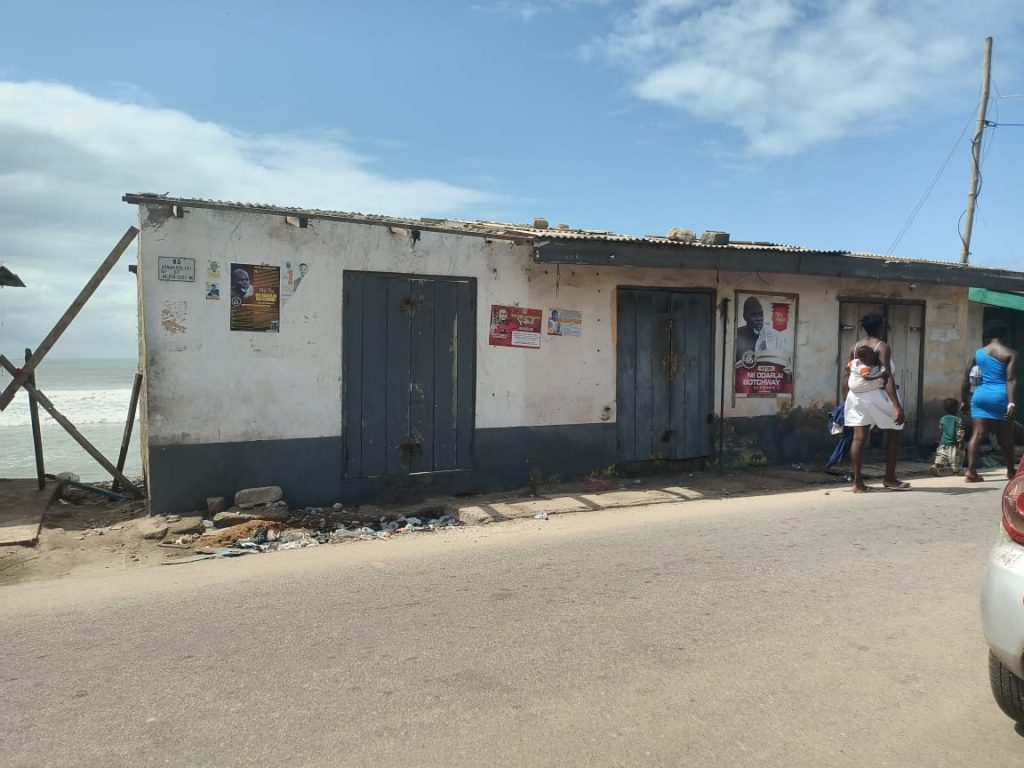A GNA feature by Edward Acquah (Fellow, Oxford Climate Journalism Network)
Accra, Dec. 11, GNA – Desperate to protect their homes from the ruthless sea waves, Nii Quaye, a fisherman and his neighbours residing along the coast of Dansoman, a suburb of Accra, have spent months building sand walls as defence against the waves.
What was once a safe 300-meter buffer zone between the families’ homes and the shoreline has dwindled to a precarious 50 meters—or just 10 steps—in less than a decade. This dramatic shift has left residents battling recurrent flooding that submerges their valuables and threatens their way of life.
For the fishermen who call this place home, the ocean’s roar is no longer a soothing melody. It is a warning, a threat, a reminder of the battle they wage every day against the encroaching waves.
The sea is eating away their land inch by inch, devouring the very ground beneath their feet. The residents have, therefore, turned to ancient and fragile defence – sand walls.

Before the sun rises over the horizon, they gather on the beach, armed with nothing but shovels, buckets and determination, working tirelessly to construct barriers of sand and hope against the relentless tide.
However, the sea, being a cruel foe, laughs at their efforts, sweeping away their hard work with a single wave. The costal dwellers wake up each morning to find their walls destroyed, their progress erased.
Nonetheless, they persevere by rebuilding, adapting and consoling themselves with the gift of life. They know that their battle is futile, yet they fight on, driven by a fierce love for their land and their basic activities of survival.
“We wake up to find our rooms flooded, our possessions buried under sand and water,” Nii Quaye lamented. “The sea doesn’t just stop; it keeps coming closer every year.”
Extent of Damage
As the ocean continues its relentless march inland, Ghana’s coastal dwellers count their losses on daily basis as they swim helplessly against the tide to protect their valuables.
The World Bank estimates that 5.5 million coastal residents in Ghana face significant challenges as 80 per cent of the coastline is highly vulnerable to erosion and flooding – with some areas eroding at four to 12 metres annually.
Ghana’s coastline is estimated to be 550km, out of which two-thirds (367km) is affected by coastal erosion and flooding, according to the National Adaptation Plan Framework.
Anytime the sea waves crash against the shore, the defenceless residents along the vulnerable coasts of Keta, Ada, Prampram, Dansoman, Anomabo, Elimina, Cape Coast and their catchment communities are hunted by eroding homes, flooding markets, and destruction of fishing gear and essential resources.
The livelihoods of many coastal dwellers, majority of whom are fishermen, fishmongers and hoteliers, face further destruction in the absence of concrete infrastructure to silence the waves.
Amid the urgency for economic rebound following the COVID-19 pandemic, the demand for expansion and completion of sea defence projects has been dimmed after years of unfulfilled promises.
Ben Commey, 39, a retired footballer, who owned one of the largest beach resorts in Accra, cannot accept the harsh reality that in the last three years, about 80 per cent of the GHS1.3 million resort he established, less than a decade ago, has been occupied by the sea.

The owner of the once famous Overmas 1 Beach Resort says he has spent more than GHS150,000 in the last two years to purchase rocks to protect the remaining eight of the 16 bedroom facility he built as part of his lifetime investments.
“I have sold all my properties inland, including three cars in the attempt to purchase rocks to protect the remaining portions of my resort. This fight is beyond my control. I cannot afford to lose everything,” he laments.
Are there interventions?
In August 2024, the Government of Ghana and the World Bank committed 155 million dollars in grants and loans towards the building of Ghana’s coastal area resilience.
The intervention, which is being piloted under the “West Africa Coastal Areas Resilience Investment Project”, is expected to promote the nation’s blue economy as it “aims at addressing coastal erosion, flooding, pollution, and ecosystem vulnerability nationally and regionally.”
The intervention may only scratch the surface of problem as the World Bank estimates that Ghana requires $1.14 billion to build sea defence walls to protect the shorelines in communities most at risk.
Amid continuous depreciation of the local currency (Cedi) and rising inflation (which stood at 22.1 per cent in October) Ghana has sought a bailout from the International Monetary Fund (IMF) to stabilise the economy.
With the IMF Programme compelling the Government to drastically cut expenditure, there are fears that the country may not be able to raise the required $9.3 to US$ 15.5 billion of investment to undertake critical climate interventions as captured in Ghana’s Nationally Determined Contributions.
Proposal from Academia
Professor Elvis Asare-Bediako, the Vice Chancellor, University for Energy and Natural Resources (UENR), told the Ghana News Agency that the rate of coastal erosion was threatening and should be a national concern.
He proposed the use of satellite imagery to measure the rate of erosion to inform structural planning and interventions to reduce the danger it poses to settlers and prevent further destruction.
“The satellite imaging will help you know the possible harm that can occur before you undertake any project. You can use the technology to predict events, which helps to plan better,” he noted.
Dr Portia Adade Williams, Technical Advisor to the Africa Group of Negotiators on the Global Goal on Adaptation, urged Ghana to engage with international climate mechanisms such as the Green Climate Fund, Adaptation, Global Environment Facility, and Climate Investment Funds to raise funds to finance critical climate interventions.

“As Africa pushes for an ambitious new financial commitment at COP 29, Ghana should advocate a fair and accessible financial framework. This framework will ensure that financing meets the scale needed to support vulnerable countries in adapting to and mitigation climate impacts,” she said.
Mr Jacob Johnson Attakpah, Zero Waste Cities Project Manager, Green Africa Youth Organisation, noted that there are financial facilities available for Ghana to tap into but “she is not investing in the right places” to attract the needed funding.
“For example, the green energy sector is one of the areas we can attract funding…the green fraction of our electrification is nothing to write home about. I think we are not investing in the right places,” he added.
The devastating impact of climate change on coastal dwellers is a harsh reality that can no longer be ignored. Rising sea levels, intense storms, and unpredictable weather patterns are just a few of the consequences of inaction.
The lack of investments in climate actions is not only a threat to the environment, but also to the very livelihoods of these vulnerable communities.
By supporting vulnerable countries to invest in climate resilience and adaptation measures, Ghana and other countries facing financial challenges can protect the lives and livelihoods of coastal dwellers.

Initiatives such as sea defence and climate-resilient infrastructure must be prioritised to serve as sustainable sea defence mechanisms to safeguard the property and livelihoods of coastal settlers.
GNA
Writers email: [email protected]